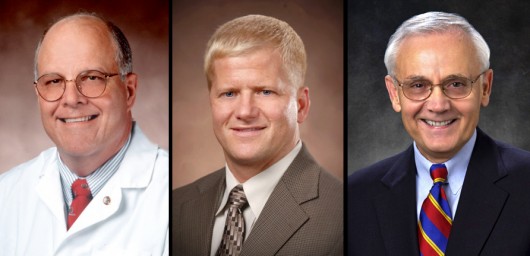Ohio State recently announced administrative changes in the College of Veterinary Medicine following a one-year appointment extension of the college’s dean, Lonnie King.
The extension, which is set to last through August 2015, was granted by Interim President Joseph Alutto and Provost Joseph Steinmetz to assist in the transition to newly appointed OSU President Michael Drake, said College of Veterinary Medicine spokeswoman Melissa Weber.
“Because of the importance of health sciences at Ohio State, Dr. Alutto and Dr. Steinmetz wanted Dr. King to remain for another year so that he can help introduce our new president to the great things that the health science colleges have to offer,” Weber said.
King’s salary is slated to increase to $303,000 from about $290,293 following his appointment extension, Weber said.
In addition to serving as dean of the College of Veterinary Medicine since September 2009, King is the executive dean of the Health Sciences Colleges and the Ruth Stanton Chair in Veterinary Medicine.
“He is also a member of the Institute of Medicine of the National Academies of Science and serves on several national committees about One Health. His national duties require him to be away from campus often,” Weber said in an email.
One Health is an effort to address links between human health, animal health and the environment, according to the College of Veterinary Medicine website.
To help assist with King’s additional duties and roles, the College of Veterinary Medicine created a new position of associate executive dean, which will be filled by Rustin Moore, according to a February OSU press release.
Moore also served as the associate dean for clinical and outreach programs, executive director of the Veterinary Medical Center and chair in Department of Veterinary Clinical Sciences. His new role was effective March 3, according to the release.
Moore is set to receive a 5 percent salary increase to $246,048 from $235,345 for his new administrative duties, Weber said.
Moore said his duties as associate executive dean include external relations.
“That’s relationships with veterinary practitioners, building and maintaining relationships with them,” Moore said. “That could be everything from visiting them, to getting feedback regarding our services at the Veterinary Medical Center and regarding feedback on their view of our graduates and to enhance our services for the patients they send to us.”
Moore added he is also responsible for donor relations.
“That translates into one of our major activities now which is the capital campaign. Our main priority is raising the funds for an expansion and an enhancement of the College of Veterinary Medicine and Medical Center, in particular the Small Animal Hospital and Hospital for Companion Animals,” Moore said.
That expansion is a $30 million campaign, which would build more space for patients, Moore said.
John Hubbell then filled Moore’s position as chair of the Department of Veterinary Clinical Sciences temporarily, as a national search for a permanent chair is conducted.
Weber said Hubbell will not receive a base salary increase, but is slated to earn an additional “administrative attachment” while he serves as interim chair. He earned $211,256 in 2013, Weber said.
Steinmetz said he’s happy with the changes.
“We appreciate Dr. King’s willingness to extend his appointment as dean of the college and executive dean of the health sciences colleges for another year,” Steinmetz said in a released statement. “Dr. Rustin Moore’s appointment as associate executive dean will assist Dr. King during the upcoming transition year. In addition, Dr. John Hubbell’s stepping in as interim chair of the Department of Veterinary Clinical Sciences will continue the department’s momentum while a national search for a new chair is underway.”
A national search for a new dean is set to start this fall with the goal of appointing someone who would start Sept. 1, 2015, after King’s one-year appointment extension ends.



